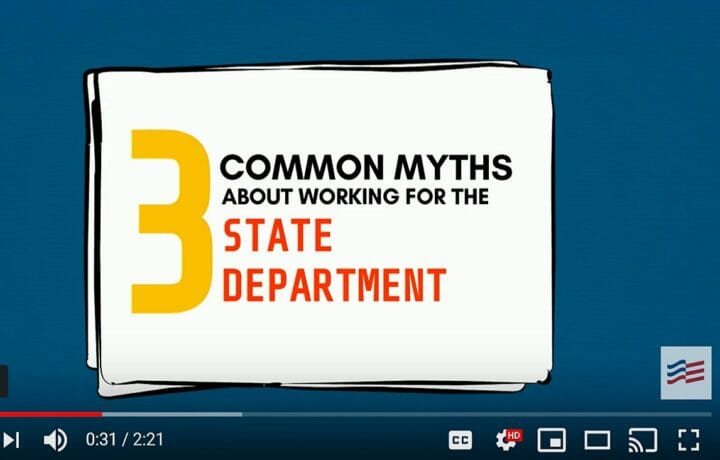The U.S. Department of State, more commonly known as the State Department, works with the executive branch of the government to carry out foreign policy and international relations.
The Department offers a variety of career tracks and opportunities, but the two main employment categories are the Civil Service and the Foreign Service. When you think of the State Department, you’re probably thinking about the Foreign Service – but that’s just one part of State’s important mission. Here are three common myths about working for the State Department.
Myth #1: All State Department employees work overseas.
It’s true, Foreign Service employees must be willing to be on the move, and employees spend about two-thirds of their careers overseas. But those in the State Department’s Civil Service don’t fall under that requirement, and may spend an entire career without stepping a foot abroad. The State Department has approximately 75,000 employees, and the majority of them are local employees serving in overseas locations. Foreign Service -personnel make up approximately 13,000 of the Department’s employees, and there are approximately 10,000 Civil Service employees. Foreign Service employees include Foreign Service Officers (FSOs) and Foreign Service Specialists. The latter provide critical expertise to the security, business, and operational functions of diplomacy.
Myth #2: You have to speak a foreign language.
You aren’t required to know a foreign language in order to become a Foreign Service Officer., It’s more important to have strong proficiency in the English language, and adaptability and willingness to learn, than to be well versed in a half dozen languages. Foreign language proficiency is not part of the Foreign Service Officer Test or the Foreign Service Specialist application processes. Facility in a foreign language can be helpful, however, in making an individual competitive as an overall candidate. The State Department awards extra points on a candidacy for facility in critical languages.
Myth #3: The State Department sets foreign policy independently.
The executive branch sets foreign policy, which means the State Department is simply carrying out the policies of the White House. But if politics aren’t your thing, it’s important to keep in mind that many of the missions of the State Department are cultural and procedural – and those programs transcend politics, and withstand the ebb and flow of political party changes.
The State Department offers an exciting, rewarding career for professionals who would like to give back to their country and impact the world. Don’t let the myths fool you – if you have the skills and the passion, see if a State Department career is right for you.




